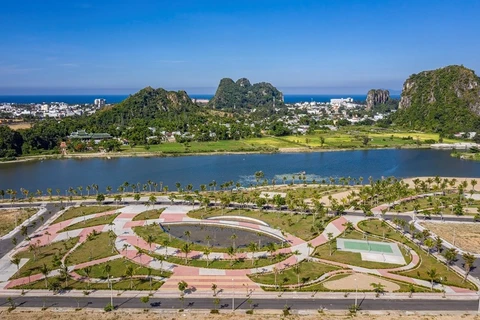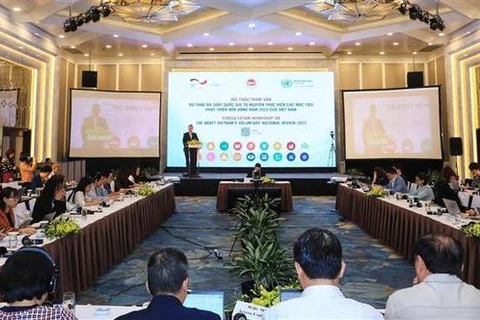
Hanoi (VNA) – Among the 17 sustainable development goals Vietnam committed to at the 2030 Agenda, only four have been fulfilled so far and two have been delayed.
Domestic and foreign experts shared the view that there are only seven years left, so there is no time for hesitation. Vietnam needs to make greater efforts and stay resolved to accomplish its goals.

A host of challenges ahead
The 2030 Agenda for Sustainable Development was adopted by United Nations member states in September 2015 with a focus on 17 Sustainable Development Goals (SDGs).
Vietnam first put forth and presented its Voluntary National Review (VNR), which outlines the country's roadmap for SDGs implementation, in 2018. In 2023, the country has registered to present its second review, alongside 41 other countries worldwide.
Pham My Hang Phuong, a representative of the expert group advising on the VNR report, said Vietnam has made significant progress in four goals - no poverty (Goal 1), clean water and sanitation (Goal 6), industry, innovation, and infrastructure (Goal 9) and reduced inequalities (Goal 10).
Specifically, its multidimensional poverty rate dropped to 3.6% from 9.2% during the 2016-2022 period. Up to 98.1% of the population gained access to clean water and 95.6% used hygienic toilets.
Vietnam has also prioritised investment in infrastructure and technology, resulting in impressive improvements in industrial development, along with investment in innovation and infrastructure construction.

Solutions needed to fast track
"If Vietnam maintains the progress in the remaining years, it will achieve most of the indicators by 2030," Phuong noted.
Apart from the progress, the report pointed out, the country is falling behind in two goals – affordable and clean energy (Goal 7) and life on land (Goal 15).
Le Viet Anh, Director of the Department of Science, Education, Natural Resources and Environment at the Ministry of Planning and Investment, stressed that climate change remains a challenge to Vietnam in efforts to maintain its performance in realising the SDGs.
However, Vietnam is still strongly committed to materialising the national action plan implementing the 2030 Agenda for Sustainable Development, and following the roadmap for the realisation of the SDGs, which have been integrated into socio-economic development strategies and plans.
Naomi Kitahara, Acting Resident Representative of the UN in Vietnam, said many countries are now in the same situation as Vietnam, where there are no statistics to be reported. This will affect the achievement of the SDGs.
She noted that the VNR should not be considered a target but a tool mobilising resources and creating social consensus for the SDGs, and suggested Vietnam take specific actions to soon hit the goals.
 Apart from investing in human resources, innovation, and digitalisation to raise productivity, Vietnam also needs to prioritise the green economy. (Photo: kinhtemoitruong.vn)
Apart from investing in human resources, innovation, and digitalisation to raise productivity, Vietnam also needs to prioritise the green economy. (Photo: kinhtemoitruong.vn)
Kitahara recommended that the Vietnamese Government provide specific and creative data for analysis rather than just general observations.
UNDP statistics show that each dong invested in social welfare will yield more than one dong for GDP, which reflects the necessity of these policies, she said, noting that with only seven years left to achieve the goals, Vietnam needs to make use of every day and hour and maintain the progress the country has made so far.
To ensure the successful implementation of the 2030 Agenda, the research group suggested Vietnam speed up the realisation of the unfulfilled goals, while further expanding partnerships to accelerate the work, focusing on mobilising financial resources.
Vietnam should address priorities, including macro-economic stability and post-COVID-19 recovery, Phuong said, highlighting the mobilisation of additional financial sources and the efficiency of the use of the existing financial sources for the SDGs.
Apart from investing in human resources, innovation, and digitalisation to raise productivity, Vietnam also needs to prioritise the green economy, the circular economy, resilience to natural disasters, and adaptation to climate change.
Greater efforts are needed to achieve SDGs for vulnerable groups, particularly the poor and ethnic minority groups, she said.
To achieve the goals, the Government Office has recently issued Notice No. 85/TB-VPCP on March 21, 2023 on conclusions by Deputy Prime Minister Tran Hong Ha at a meeting on the draft roadmap for the implementation of Vietnam's SDGs by 2030.
Ha assigned the Ministry of Planning and Investment to review and determine all goals Vietnam committed in the roadmap, saying achievable goals should be submitted to the National Assembly to be included in annual socio-economic development plans.
Meanwhile, the fulfilled goals need to be further strengthened to raise their efficiency. For the unfulfilled goals, specific targets must be identified. In the long term, all of the SDGs must be submitted to the legislature.
Ha also asked the Ministry of Planning and Investment to assess the implementation of the SDGs and report results to competent agencies./.






















